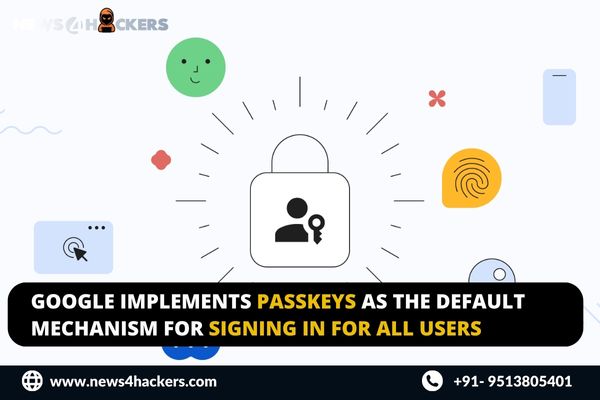Google Implements Passkeys as the Default Mechanism for Signing in for All Users

Google Implements Passkeys as the Default Mechanism for Signing in for All Users
On Tuesday, Google made an announcement on the implementation of passkeys as the default setting for all users. This update comes five months after the introduction of support for the passwordless standard backed by the FIDO Alliance, which was made available for Google Accounts across all platforms.
According to Sriram Karra and Christiaan Brand from Google, users would see prompts to generate and utilize passkeys on their next account login, hence streamlining subsequent sign-in processes.
Additionally, this implies that the ‘skip password when possible’ option will be enabled inside the settings of your Google Account.
Passkeys are a novel method of authentication that effectively obviates the necessity for usernames and passwords, hence dispensing with the requirement for any supplementary authentication element.
In essence, the described mechanism pertains to a login system devoid of passwords, wherein public-key cryptography is employed to verify users’ authorization for accessing websites and applications. The private key is safely maintained within the device, while the server retains the corresponding public key.
Every passkey is distinct and associated with a username and a particular service. Consequently, a user will own a minimum number of passkeys equivalent to the number of accounts they have. However, it is possible for there to be many passkeys per account, as passkeys operate exclusively inside the boundaries of the same platform.
Consequently, it is possible for a user to possess a singular passkey for each respective website on the Android, iOS, macOS, and Windows platforms.
Therefore, when a user logs into a website or application that uses passkeys, a randomly generated challenge is generated and transmitted to the client. Subsequently, the user is prompted to authenticate themselves by utilizing their biometric information or a personal identification number (PIN). This authentication process enables the user to sign the challenge using their private key and subsequently transmit it back to the server.
The success of authentication is determined by the ability to validate the signed response using the corresponding public key.
Passkeys offer an instant dual advantage by eliminating the inconvenience of password memorization and providing protection against phishing attempts, therefore enhancing the security of user accounts and mitigating the risk of unauthorized access.
The introduction of this improvement follows Microsoft’s recent use of passkeys in Windows 11, which aims to enhance the security of user accounts. In recent months, several extensively utilized services such as eBay and Uber have implemented passkey functionality.
About The Author:
Yogesh Naager is a content marketer who specializes in the cybersecurity and B2B space. Besides writing for the News4Hackers blog, he’s also written for brands including CollegeDunia, Utsav Fashion, and NASSCOM. Naager entered the field of content in an unusual way. He began his career as an insurance sales executive, where he developed an interest in simplifying difficult concepts. He also combines this interest with a love of narrative, which makes him a good writer in the cybersecurity field. In the bottom line, he frequently writes for Craw Security.
Read More Article Here:






